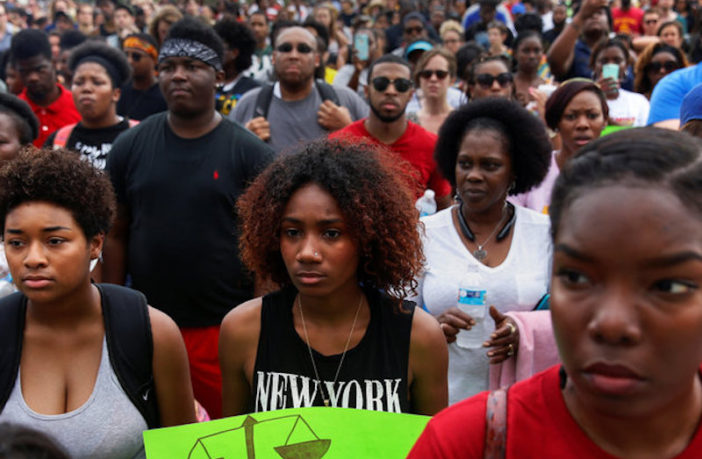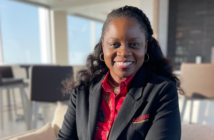Being Black is exhausting.
Every day when I walk down the street, I know what to expect. Men will suddenly cling to their wallets as I pass. Women will clutch their purses tightly. The seat next to me on the train will remain empty, no matter how crowded the car becomes. As I make my way to my destination, sometimes people will break out into a full sprint at just the sight of me. It happens day after day, often many times a day.
It doesn’t matter how impressive my resume is or that I live in a great apartment in a nice neighborhood. They don’t see award-winning journalist and author or even a respectable human being. Just a black person who frightens them. A scary black guy.
For Black people, it doesn’t matter if our figures are clothed in a suit or a T-shirt and jeans. Big, skinny, rich, poor — these one-sided confrontations happen to every one of us.
I used to be angry about it. Sometimes cry or yell out in frustration when I finally reached the sanctuary of my home. But I realized most White people don’t know any Black people personally. On average, 91 percent of a White person’s friends are also White, according to the Public Religion Research Institute. In many cases, their interactions are limited to the comedic antics they see in the movies and television or the association with violence they see in the news. With this narrow focus, Black becomes an other.
Black people come in a variety of shades, backgrounds, income levels… yet it’s this thread of perceived inequality that binds us together.
For decades, we’ve inured ourselves to it. We’ve discussed the ongoing degradation from our fairer-skinned counterparts privately, but resigned ourselves to it being “the way things are.” Not anymore. The increased visibility of the shooting deaths of unarmed Black people and the rise of the Black Lives Matter movement shook us out of our defeatedness.
Social media has brought us together to comfort each other, to share our experiences. Conversations that were previously only held in barbershops, churches or with our immediate family and friends have now become a global dialogue. We’re seeking to put an end to a centuries-old construct of systemic racism.
The accomplishments of prolific black people haven’t changed racial bias in this country so we need to stop pretending that they have. The Lebron James and Barack Obamas of the world have done great things. However, we as a society cannot ignore the inequity that persists. The average black person will face injustices the moment they step out of their home, no matter their stature.
The phrase “Black Lives Matter” is about more than just policing. It extends to these everyday interactions as well. Being told implicitly or explicitly that we are less than.
“Stay Woke” has become a common refrain for people of color — be aware of the injustices happening around you and to that end, do something about it.
So we’re woke… what happens next? Now is the time to take that energy and transform it into change. When Rosa Parks sat down on that bus in Montgomery, Alabama, she knew the real struggle would begin after.
So we’re woke… what happens next? Now is the time to take that energy and transform it into change.
DEMAND TRUE REPRESENTATION
We must demand representation in the spaces in which we as Black people exist. We must be bold in championing for inclusion in the media we consume. African-Americans have a total spending power of 1.1 trillion dollars, according to a Nielsen report. Of that, we spend hundreds of millions of dollars at the movies every year. Why shouldn’t we see faces of color greeting us from the silver screens?
This is why movements like #OscarsSoWhite were born. They grew in response to the pale makeup of recent Oscar nominees. The voices of the protestors did not go unheard. The unrelenting social media outcry led to a landmark rewrite of the Academy’s voting rules and membership.
From cineplexes on to fine art institutions, artists like Kehinde Wiley have reclaimed images that are often portrayed as negative — Black men cloaked in hoodies and fitted caps — and turned them into glorious figures.
Beyoncé used the Super Bowl — one of the world’s biggest stages — to perform an anthem celebrating Blackness. The world took notice.
Pioneers have established game plans for other Black people to follow. They’ve taught us how to turn our discussions into actions.
If you’re saying to yourself who am I? I can’t do anything. Yes you can. Don’t let fear of the unknown make you shrink into yourself. Think about what’s happening in your life right now and how you can improve it.
When I was in junior high school, my teacher assigned the class a final project — pick one author and three books they’ve written. Write a report on the commonalities of the three books. I picked a black author — Ernest J. Gaines, writer of “The Autobiography of Miss Jane Pittman,” “A Gathering of Old Men” and the Pulitzer Prize finalist “A Lesson Before Dying.” The teacher sent a note home to my mother. I’m extremely disappointed in Mark. He’s a very smart kid and should have picked a stronger author like Shakespeare or Charles Dickens. My mother, being the opinionated woman she is who raised an equally opinionated son, marched to the school and demanded to know why her child was discouraged from picking a Black author and, furthermore, why there were so few books by black authors assigned at a school populated mostly by Black children.
Be unrelenting. Representation matters.
Employees, managers, executives at businesses of all types have been emboldened by social media to call for changes in their workplaces and in their respective industries. Equal pay, a welcoming environment free from microagressions and condescension, greater diversity.
Show your companies that if their hiring process can’t find people of color, that it’s more likely that their pipeline is broken. We are here and we are talented and no less capable than anyone else. We have to let employers know that they cannot and should not doubt our competence solely based on the color of our skin.
When someone says you only got here because of affirmative action or you’re not as qualified as your classmates or coworkers, show them the receipts. Show them your degrees or your accolades or your previous accomplishments. Humility is overrated, especially in the face of denigration. If you don’t correct people who seek to discredit you, then who will?
Whether you’re at work or in your private life, don’t be dissuaded by being called an “angry black person.” It is a distraction. Don’t allow someone to invalidate your experiences just because they haven’t felt them firsthand. Shake their foundation and challenge their perceptions.
Some people are more offended by being called “racist” than the notion that racism still exists in this country. Reaffirm that the demand for equality is not a personal attack. That being pro-Black does not mean anti-white. A change to systemic racism will require work from everyone… of all colors.
After decades of segregation, black people, we’ve become accustomed to segregating ourselves in the name of self-preservation. While it’s easy to shy away from being a de facto representative of your entire race, we must exert ourselves. Visibility matters.
Whether you’re at work or in your private life, don’t be dissuaded by being called an “angry black person.” It is a distraction.
A few years ago, I found myself in Eastern Russia for a work trip. This is a place where few residents had ever seen a black person in real life before. People were literally stopping in the streets, coming up to me, curiously touching my brown skin. My first instinct was to back away quickly. Why are these people all up on me? Instead I saw it as a learning opportunity for all of us. I answered questions about what it’s like to be Black in America, to grow up in South Central L.A., what kind of food I ate and whether or not I knew Snoop Dogg (I don’t).
I carried that lesson with me back to the United States. It’s open exchanges like these that lead to greater racial understanding. These conversations go on to be shared with friends and friends of friends. Whether you know it or not, your honesty and vulnerability has the potential affect an entire community.
We know that it is easier to be biased against a group of people if you don’t any one of them personally. To that I say, be the “black friend.” I know, I know…we’ve all been in that situation where we looked around and said to ourselves “I’m the only person of color in this room.” But don’t let other people make you an outsider.
Reverse the trend and look for opportunities to bring your white friends into your spaces. Take them to the club or to a lounge. Treat them to the familial environment of a soul food restaurant or the spiritual nourishment of the black church. Extol to them the writings of Zora Neale Hurston or the power in Nia Long’s fingertips.
STAY CREATIVE, BE SUCCESSFUL
We must continue to build, to be creative in defiance of a culture that sees us less than. A society that appropriates our creativity and discards the hardships that come with it. Despite the shackles of negativity that seek to bring us down, Black people continue to be great. We launch our own businesses, we cultivate our communities. It’s what we do. Its what we’ve done for years. We flourish.
So be whatever Black you are. Rock your locks. Flip your twists. Wear your dashiki or your hoodie or your fresh-pressed suit. Love yourself in spite of a system that says you aren’t beautiful or talented or educated.
If you’re feeling resigned, rely on the soulful music that seeks to uplift us. Let Kendrick Lamar inspire you. Feel the embrace of Nina Simone and Marvin Gaye. Hear the words of Gil Scott-Heron and James Brown. Let Beyoncé put you back in formation. Soak in the lyrics that reaffirm that black is beautiful.
Create art. Express yourself. Even if it isn’t part of your 9 to 5. Graduate. Get that AA or that PhD. If you accomplish something great, whether it’s big or small, share it on every social media account you have. There is power in your selfie, transcendence in your blog post. Let us celebrate your excellence and in turn you may inspire someone else.
You don’t have to set out to change the whole world, just the world around you. And that is what will bring us together and move us forward.



